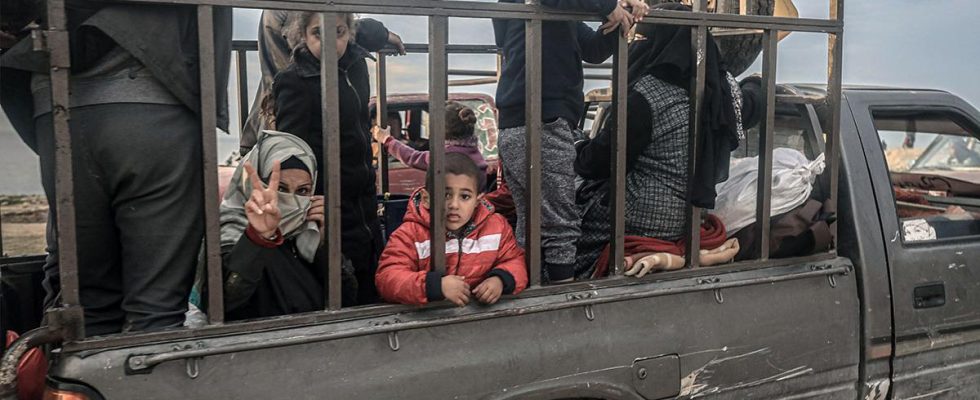unsaveSave
DEIR AL-BALAH/STOCKHOLM. A ground invasion threatens the last safe place in Gaza.
Now more and more are fleeing north – back to the war.
– Where are we going? The whole world must hear our voice, the war must end, says the mother of young children Sabreen Walid Rizk Rashid.
On the night of Monday, the Israeli military bombed the border town of Rafah in southern Gaza.
Over a million Palestinians seeking refuge were awakened by warplanes and helicopters.
Around 100 of them are feared to have been killed, including a 40-day-old baby.
For the mother of young children Sabreen Walid Rizk Rashid, it was the final straw.
Now she and the children have fled for the third time.
This time from the refuge of Rafah to the north, to Deir al-Balah in central Gaza, where the fighting fluctuates in intensity.
Several families are now fleeing the refuge of Rafah, where Israel is planning a ground offensive.
1 / 3Photo: Muhammad Al-Masry
Aftonbladet’s emissary meets them in a spartan refugee camp, among tents and thin tarpaulins. The mother cooks rice over a makeshift hearth.
She talks about family members who have been injured and killed, big and small.
– Children, young people, why are they murdered in this way? says Sabreen Walid Rizk Rashid, breaking down in tears.
– Why are we insignificant? What have we done to them?
Invasion warning
She describes the time in Rafah as very difficult. The Israeli military has called on Palestinians to evacuate there as it carries out its ground offensive against northern, central and southern Gaza with the aim of crushing terror-labelled Hamas. The majority of Gaza’s 2.3 million residents are now in the city, which previously housed 280,000 people.
– We lived on the street for six days. Nobody cared about us. There is no place at all for refugees, most of the people live on the streets, says Sabreen Walid Rizk Rashid.
And now Rafah is not safe either.
Families fleeing Rafah, several have made it to Deir al-Balah in central Gaza.
1 / 3Photo: Muhammad Al-Masry
The attack on the night of Monday, when the Israeli military also freed two men from hostages, was more extensive than the previous ones.
For many, it was a warning, a premonition, of the ground invasion that Israeli Prime Minister Benjamin Netanyahu has declared will begin in the refugee city.
The risk: More children are killed
Hamish Young, disaster coordinator at the UN children’s fund Unicef, experienced it from the UN building where he was sleeping.
– I can’t even imagine what it was like for the hundreds of thousands of people who live outdoors, in tents or tarpaulins.
He too has seen that many choose to leave Rafah now.
– Many are now evacuating on their own. It is mainly those who have somewhere to go, perhaps to relatives or houses that they hope will remain.
Those with the least resources will remain, he notes.
– It is those who are most fragile who now face the greatest risk.
expand-left
full screenMany Gazans are now fleeing Rafah, several have made it to Deir al-Balah in central Gaza. Photo: Muhammad Al-Masry
It would be “beyond catastrophic” if Israel were to launch an offensive against Rafah, says Young.
– More children would be killed, injured, separated from their parents. Famine and disease would increase.
Hamish Young gets frustrated, says it’s hard to describe how much an F16 plane can hurt a four-year-old.
– State-of-the-art weapons are used against children. We must bring about a truce.
expand-left
full screen Hamish Young, disaster coordinator for the UN children’s fund Unicef, on the ground in Rafah in southern Gaza. Photo: Unicef
FACT Background
More than four months have passed since October 7, when Hamas attacked Israel in what is being called the worst massacre of Jews in modern times.
Over 1,100 people, mainly Israelis, were killed and 240 people were kidnapped. Over 130 of them are still believed to be with Hamas in Gaza.
The military invasion that Israel launched shortly afterwards against the Gaza Strip – with the aim of eradicating Hamas – has been very bloody. By Palestinians it is called a new Nakba, catastrophe, just like the expulsion of Palestinians that took place in 1948 when the state of Israel was established.
According to the Hamas-controlled health department in Gaza, over 28,000 Palestinians are estimated to have been killed by Israeli attacks, the majority of them women and children. Over 65,000 have been injured.
Read more
expand-left
full screen Footnote: Muhammad Al-Masry is a freelance journalist and has worked for several major news agencies. On behalf of Aftonbladet, he reports from inside Gaza. Photo: Private
